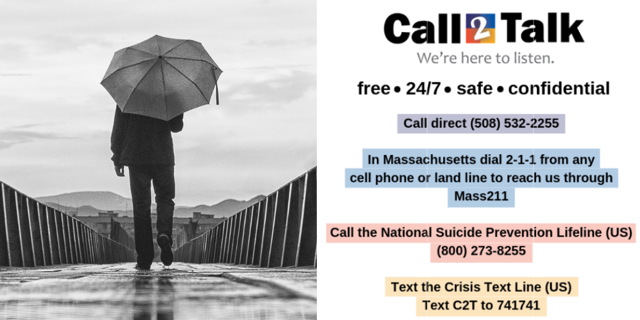[broadstreet zone=”52386″]
[broadstreet zone=”59946″]
FRAMINGHAM – September 10 is World Suicide Prevention Day.
With over 600 suicides a year in Massachusetts alone our phones are always ringing with people of all ages (as young as 8 years old recently) reaching out for emotional support and someone to talk to when they are feeling isolated and despairing, said Call2Talk Director Eileen Davis.
Today is a time to remember those impacted by suicide, raise awareness and focus on efforts that direct people to support they so desperately need. Not everyone knows where to turn or how to ask for help, she added.
Call2Talk is free and available 24/7 from anywhere, from any phone. Or you can Text C2T to 741741.
Call2Talk provides emotional support and is available to listen.
Call direct: 508-532-2255. Dial 2-1-1 from any phone in Massachusetts
Individuals can also call the National Suicide Prevention Lifeline: 1-800-273-(TALK) 8255

Warning signs of suicide
Whether you’re having thoughts of suicide or know someone who feels suicidal, learn suicide warning signs and how to reach out for immediate help and professional treatment.
You may save a life — your own or someone else’s.
Suicide warning signs or suicidal thoughts include:
- Talking about suicide: for example, making statements such as “I’m going to kill myself” or “I wish I were dead”
- Getting the means to take your own life, such as buying a gun or stockpiling pills
- Withdrawing contact with others more than usual, even though staying at home may be recommended during the COVID-19 pandemic: for example, not responding to any type of communication from others, such as calls, texts or other messages
- Having mood swings, such as being emotionally high one day and deeply discouraged the next
- Being preoccupied with death, dying or violence
- Feeling trapped or hopeless about a situation
- Excessively using alcohol or drugs
- Changing your normal routine, including eating or sleeping patterns
- Doing risky or self-destructive things, such as using drugs or driving recklessly
- Giving away belongings or getting affairs in order when there’s no other need to do so
- Saying goodbye to people as if they won’t be seen again
- Developing personality changes or being severely anxious or agitated
[broadstreet zone=”58610″]
The unique circumstances of the COVID-19 pandemic, including little social interaction, may make it more challenging to identify those at risk of suicide. Warning signs aren’t always obvious, and they may vary from person to person. Some people make their intentions clear, while others keep suicidal thoughts and feelings secret.
(Signs provided by the Mayo clinic)

